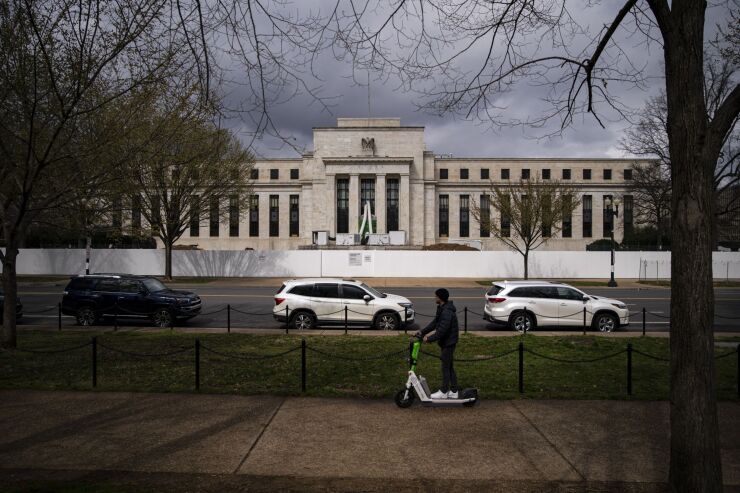
WASHINGTON — Banking groups are pushing for more transparency around how the Federal Reserve
The Bank Policy Institute and American Bankers Association
In a letter sent Monday, BPI and ABA urged the Fed to address "serious legal defects" in its stress testing regime, arguing that it had effectively created a set of "secret rules" for imposing binding capital requirements on banks. They also accused the Fed of violating the Administrative Procedures Act — also known as the APA — by not disclosing the models and formulas used in the test or detailing how it comes up with the scenarios in each year's test.
"There is no legal justification for the Federal Reserve to continue to calculate large bank capital requirements with rules that are developed and applied in secret," BPI president and CEO Greg Baer said in a statement Tuesday. "No other agency of government operates in this way: the IRS sends out tax bills based on a published code, not a secret model that determines each taxpayer's liability; speed limits are posted and consistent, not hidden or constantly varying in erratic ways to force drivers to go much slower because they don't know what they are."
A spokesperson for the Fed confirmed receipt of the letter but declined to comment on the request or any of the assertions made by the trade groups.
The request comes roughly a month after the Fed released the results of the
Bank groups have grown frustrated with the stress testing regime in recent years, arguing that it has continually driven capital requirements up, despite banks demonstrating their ability to withstand adverse scenarios, both real and imagined.
"The stress testing program remains unnecessarily opaque even though the high stakes for banks and the economy are crystal clear," ABA President and CEO Rob Nichols said. "The choices the Federal Reserve makes in its models and scenario assumptions can directly affect credit availability and have a meaningful impact on economic growth and job creation. Given the implications, the Fed should welcome more public input and embrace greater transparency. These petitions advance both."
Transparency involving stress testing has been a focal point for banking groups since at least 2018. But feelings about the current regime, which was finalized in 2020, have evolved significantly. In March 2021, BPI lauded the stress capital buffer as a "highly effective framework for limiting capital distributions to the extent necessary to ensure that banks can continue to function effectively, even under severe stress."
Under the APA, any member of the public can request a regulatory rulemaking at any time, but agencies are not bound to respond within a specific timeframe. It is not uncommon for such requests to go unanswered for years.
David Zaring, a law professor in the University of Pennsylvania's Wharton School of Business, said it is rare for the Fed to see a freedom of information request of this type and a petition for a rulemaking, let alone both at once. Yet, he noted, it might be difficult for BPI and ABA to make headway on the issue.
"Petitions for rulemaking often face challenges as courts generally don't want to oversee an agency rulemaking themselves, so they tend to defer to agency explanations of why they have not chosen to make a rule," Zaring said. "And the APA doesn't police the blocking and tackling of agency scheduling."
Todd Phillips, an independent consultant and former lawyer for the Federal Deposit Insurance Corp., said the groups' claims that the Fed is violating the APA do not hold water. He noted that the law allows agencies to make policy either through rulemaking or adjudication, with the stress test scenarios falling under the Fed's capital adjudications.
Phillips added that regulators often will not engage with rulemaking requests until compelled to do so by a court. It is not uncommon, he said, for petitions to lay dormant for years.
"I expect this is going to sit in a drawer somewhere until we have the next Republican-appointed vice chair for supervision, who will pick it up and say 'OK, now is the time to respond,'" he said.
Supporters of the current approach to stress testing argue that despite the higher capital costs associated with the regime, banks benefit from it in two ways: by identifying potential vulnerabilities on their balance sheets and from the gold-plating they receive when they pass the test. Having elements of the test kept private, they argue, gives more credibility to both elements.
Some, including Dennis Kelleher, head of the consumer advocacy group Better Markets, see the fact that banks no longer routinely fail the stress test as evidence that they
"Stress testing and capital are key to protecting Main Street families, jobs, and small businesses, but maximizing Wall Street's bonuses depends on minimizing capital. That's why they and their allies relentlessly attack the regulators — they want capital as low as possible," Kelleher said. "However, the banking regulators very carefully follow the law, including the APA, when conducting stress tests and enacting capital requirements. Claims otherwise are frivolous, but that won't stop the industry from shopping for judges hoping to find one that will ignore the law, precedent, and the public interest."






